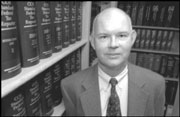HEY BABE, take a walk on the mild side.
That’s the tune being played by both declared candidates in the battle to succeed 12-year incumbent City Attorney Mark Sidran, who has taken his headline-grabbing style to the mayor’s race.
Local attorneys Tom Carr and Jim Cline actually relish the idea of forging a lower-profile approach for the office than Sidran, whose ongoing promotion of “civility” laws against misbehavior on city streets has drawn charges that he is waging a war against the poor and homeless.
And Sidran’s critics like the new look: Attorney David Osgood, who has made a career out of beating the city in court, says he’d been encouraged to challenge Sidran (who has twice run unopposed for re-election), but sees no reason to run with the incumbent on his way out and two good candidates in the race. If elected, either declared candidate “wouldn’t be nearly as draconian as what we’ve got now,” he says.
Nobody’s betting on a two-candidate race (Carr predicts that at least four more attorneys could sign up), but the political rumor mill has been all but silent about additional contenders. The city attorney’s $119,380 annual salary would represent a pay cut for any lawyer currently running even a small law firm. Given the lower salaries paid to government lawyers, a candidate from inside the city attorney’s office might be expected, but none has yet emerged. Sidran’s two top deputies won’t be in the mix: Civil division chief Jack Johnson isn’t a city resident, and criminal chief Bob Hood doesn’t meet the City Charter requirement that an attorney must practice for four years in Seattle before seeking the office.
The job has also proven to be only a so-so political springboard. Sidran’s predecessor, Doug Jewett, ran for U.S. Senate and mayor, but lost both races.
And, Sidran’s bountiful media coverage aside, there’s far more hard work than glamour to the job, says noted Seattle attorney Hugh Spitzer (not a potential candidate). He ticks off the many legal specialties practiced under the city attorney’s supervision: contracts, environmental law, land use, torts, municipal law, utilities, criminal law, domestic violence. “You’re basically the managing partner of a medium-sized law firm with a wide variety of legal specialties to cover, and it’s a demanding job,” he says. “They have as wide a scope of law practice as any firm in Seattle.”
TOM CARR certainly brings a breadth of experience to the race. A native of the South Bronx, the 44-year-old Carr spent four years as an assistant U.S. attorney in New York before beginning his current career as a civil litigator. He now works with downtown law firm Barrett Gilman & Ziker, specializing in complex commercial and environmental cases. Carr has some kind words for the incumbent’s less controversial work, crediting Sidran with establishing a domestic violence unit in the law department and mandating that criminal cases be carefully screened before charges are filed.
But Carr clearly wants to approach the job differently than the combative Sidran. “When I’m most effective for my clients, no one knows that I’m doing my job,” he says. Carr is no political neophyte, having been in the news recently as former chair of the board charged with expanding Seattle’s monorail. He also came within 371 votes of ousting former state Rep. Georgette Valle in a 1994 Democratic primary race.
Although he promises a more low- key approach, Carr’s not taking a vow of silence. A former board member of Legal Services for the Homeless and a shelter volunteer, Carr says he wouldn’t hesitate to suggest amendments to improve the civility laws. But any such changes are the decision of the council, not the city attorney, he points out. And most of Sidran’s civility laws passed the council by a 7-2 majority. “As you know, I’ve had some experience dealing with 7-2 majorities on the City Council,” he jokes, referring to council votes that went against him during his monorail board tenure.
JIM CLINE, also 44, a labor and employment attorney with Cline and Associates, declared his candidacy for the office this week. He would take an even lower profile approach to the office than Carr. Cline says that although he would share his views on the administration of justice with the council, he has no intention of lobbying for legislation. He’ll provide private legal advice to legislators, but if asked about a specific law in public, he says, “I’m not going to say that they should change it; I’m not going to say that they should continue it.”
His laid-back attitude hasn’t kept Cline from conflict with Sidran himself. As the attorney for a fledgling union of city prosecutors in 1997, Cline went into what he thought were routine contract negotiations, but Sidran flatly refused to allow fired attorneys to appeal their terminations before an arbitrator. The union (the Seattle Prosecuting Attorneys Association) took the dispute to the media and called on the City Council to intervene (to the surprise of no one, our legislators did nothing).
Ironically, unlike most Sidran critics, Cline’s law-and-order credentials are solid. He spent more than three years in the King County prosecutor’s office, and his specialty in his first years of private practice was representing police unions. He is also a proponent of teaming up law department attorneys with community police units to work with citizens in addressing neighborhood public safety problems.
So does Cline think Sidran is delighted to see his old adversary in the race? “Yeah,” deadpans Cline, tongue firmly in cheek. “I might be wrong. He might endorse me, but that would be a shock.”






